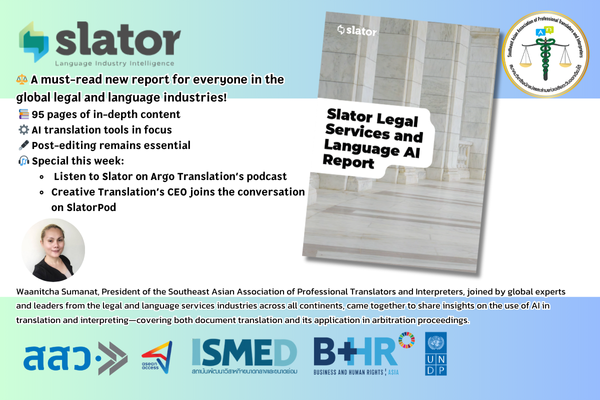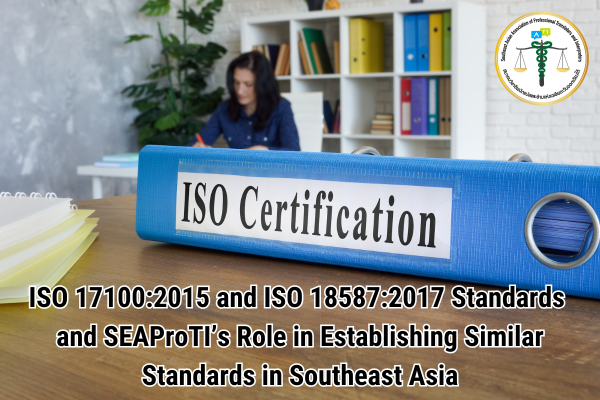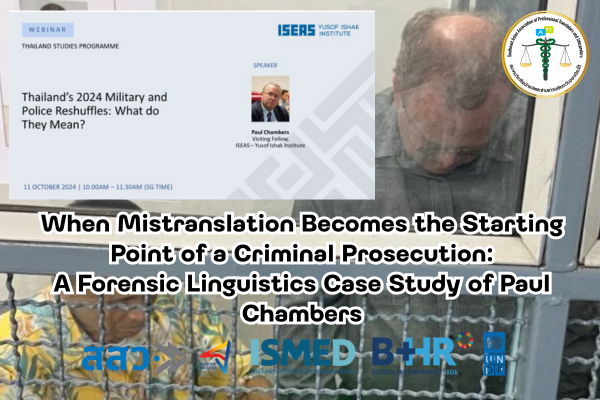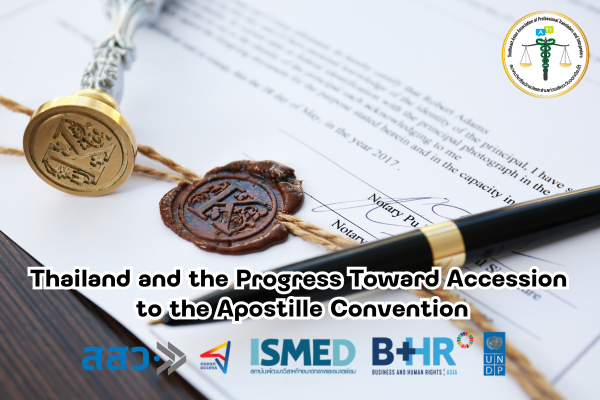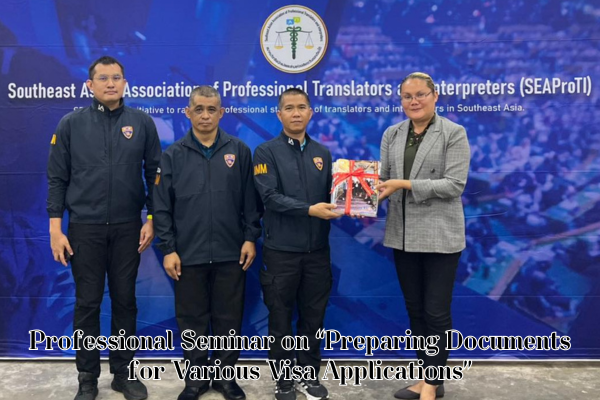AI and Language Services in the Global Legal Sector:
An Analysis of the Slator 2025 Legal Services and Language AI Report
13 April 2025, Bangkok – The rapid advancement of technology, especially in the area of Language AI, is reshaping the global legal services landscape. From legal consulting and litigation to the management of legal documentation, the impact is far-reaching. This transformation is not only influencing law firm operations but is also significantly altering the demand for translation and interpreting services across jurisdictions.
In response to this growing interest among legal and language professionals, Slator—a leading global media platform in the language industry—has released its inaugural specialized report, the Slator 2025 Legal Services and Language AI Report. Spanning 95 pages, this report decodes key trends, the evolving role of AI, and real-world applications of language technology in both public and private sector legal services.
1. The Use of AI Translation Tools in Law Firms
One of the core findings is the widespread adoption of AI translation tools as standard practice in many law firms. A Swiss attorney noted that generic large language models (LLMs) yielded “surprisingly satisfactory” translation output. However, large international law firms have cautioned against overreliance on AI without subject matter expertise, particularly when handling sensitive legal documents such as contracts, petitions, or court rulings.
2. Impact on In-house Translation Teams
According to the report, some firms have downsized their in-house translation teams due to a combination of AI adoption and a slowdown in capital markets. Nonetheless, post-editing and human review remain essential, especially for documents with legally binding force.
“There is no such thing as an unedited machine translation in law firms when it comes to client-facing documents.” — Slator interview respondent
3. The Enduring Role of LSPs and Evolving Procurement Criteria
Despite AI’s increasing presence, law firms continue to depend on Language Service Providers (LSPs) for complex litigation and technical subject matter—particularly in areas such as international arbitration. Insights from global procurement officers suggest a shift in evaluation criteria from cost-based decisions to a focus on quality and contextual legal understanding.
4. Global Market and Regulatory Analysis
The report offers a wide-ranging overview of legal and regulatory dynamics, including:
- The rise of LegalTech and integrated AI-driven translation tools
- The impact of the European Union’s Unitary Patent on language service demand
- Comparative analysis of language-related regulations across regions such as the US, Europe, Asia-Pacific, Latin America, and the Middle East
5. Credible and Multi-source Research Foundation
The report draws on a variety of trusted sources:
- Interviews with senior partners and legal experts from top law firms
- Government-backed studies and public-sector data
- Input from LSP executives and language AI researchers
📌 Conclusion
The Slator 2025 Legal Services and Language AI Report is more than just a commercial research product. It is an essential strategic resource for:
- Lawyers and corporate legal departments requiring multilingual solutions
- LSP executives and technology providers
- Researchers and academics in the fields of LegalTech and Translation Studies
This comprehensive report empowers stakeholders to better understand emerging global trends and develop forward-looking strategies in a world where artificial intelligence presents both opportunities and challenges for legal and language professionals alike.
📘 Download the full report or learn more at:
👉 Slator 2025 Legal Services and Language AI Report
✍️ Compiled by the Research and Industry Analysis Division, Southeast Asian Association of Professional Translators and Interpreters (SEAProTI)
SEAProTI’s certified translators, translation certification providers, and certified interpreters:
The Southeast Asian Association of Professional Translators and Interpreters (SEAProTI) has officially announced the criteria and qualifications for individuals to register as “Certified Translators,” “Translation Certification Providers,” and “Certified Interpreters” under the association’s regulations. These guidelines are detailed in Sections 9 and 10 of the Royal Thai Government Gazette, issued by the Secretariat of the Cabinet under the Office of the Prime Minister of the Kingdom of Thailand, dated July 25, 2024, Volume 141, Part 66 Ng, Page 100.
To read the full publication, visit: the Royal Thai Government Gazette
AI กับบริการภาษาในแวดวงกฎหมายโลก:
วิเคราะห์จากรายงาน Slator 2025 Legal Services and Language AI Report
13 เมษายน 2568, กรุงเทพมหานคร – การเปลี่ยนแปลงอย่างรวดเร็วของเทคโนโลยี โดยเฉพาะปัญญาประดิษฐ์ด้านภาษา (Language AI) กำลังสร้างแรงสั่นสะเทือนในแวดวงบริการกฎหมายทั่วโลก ทั้งในส่วนของการให้คำปรึกษา การดำเนินคดี และการบริหารจัดการข้อมูลทางกฎหมาย ปรากฏการณ์นี้ไม่เพียงส่งผลต่อแนวปฏิบัติของสำนักงานกฎหมายเท่านั้น แต่ยังเปลี่ยนแปลงความต้องการใช้บริการแปลและล่ามอย่างมีนัยสำคัญ
เพื่อรองรับความสนใจของนักวิชาชีพทั่วโลก Slator — สื่อชั้นนำด้านอุตสาหกรรมภาษา — ได้เผยแพร่ รายงาน Slator 2025 Legal Services and Language AI Report ความยาว 95 หน้า ซึ่งเป็นครั้งแรกที่ Slatorจัดทำรายงานเฉพาะทางในประเด็นนี้ โดยมีวัตถุประสงค์เพื่อถอดรหัสแนวโน้ม บทบาทของเทคโนโลยี และการใช้งานจริงของ AI ในบริการด้านภาษาในภาคกฎหมายทั้งภาครัฐและเอกชน
1. การใช้งาน AI Translation Tools ในสำนักงานกฎหมาย
หนึ่งในประเด็นหลักของรายงานคือการยืนยันว่า AI ได้กลายเป็นเครื่องมือมาตรฐานในหลายสำนักงานกฎหมาย ทนายจากสวิตเซอร์แลนด์รายหนึ่งระบุว่า โมเดลภาษาแบบทั่วไป (Generic LLMs) ได้ผลลัพธ์ด้านการแปลที่ “น่าพอใจอย่างน่าประหลาดใจ” ในขณะเดียวกัน สำนักงานกฎหมายขนาดใหญ่เตือนว่า การใช้ AI โดยปราศจากความเข้าใจเชิงลึกอาจก่อให้เกิดความผิดพลาดได้ โดยเฉพาะใน เอกสารเฉพาะทาง เช่น สัญญา การยื่นคำร้อง หรือคำพิพากษา
2. ผลกระทบต่อทีมแปลภายใน (In-house Translation Teams)
หลายบริษัทเปิดเผยว่า การใช้งาน AI ควบคู่กับภาวะชะลอตัวของตลาดทุน ได้ส่งผลให้มีการ “ลดขนาด” ทีมแปลภายในองค์กร แม้จะเป็นสัญญาณของการเปลี่ยนผ่านสู่เทคโนโลยี แต่รายงานระบุว่า บริการภาษาที่มีผู้เชี่ยวชาญตรวจทาน (Post-editing / Human Review) ยังคงมีความจำเป็นสูง โดยเฉพาะเอกสารที่ต้องมีผลผูกพันทางกฎหมาย
“ไม่มีสำนักงานกฎหมายใดใช้ Machine Translation โดยไม่ตรวจทาน สำหรับเอกสารที่ต้องส่งให้ลูกค้า” – จากการสัมภาษณ์ในรายงาน
3. ความสำคัญของ LSPs และแนวโน้มการจัดซื้อ
แม้ว่า AI จะเข้ามามีบทบาทมากขึ้น แต่สำนักงานกฎหมายยังคงพึ่งพา Language Service Providers (LSPs) ในคดีความขนาดใหญ่ หรืองานที่มีเนื้อหาทางเทคนิคเฉพาะทาง เช่น อนุญาโตตุลาการระหว่างประเทศ รายงานยังเสนอข้อมูลจากฝ่ายจัดซื้อของสำนักงานกฎหมายชั้นนำทั่วโลก ซึ่งชี้ให้เห็นว่าเกณฑ์การเลือกผู้ให้บริการภาษาเริ่มเปลี่ยนจาก “ต้นทุน” เป็น “คุณภาพ + ความเข้าใจทางบริบทกฎหมาย”
4. การวิเคราะห์ตลาดและกฎระเบียบระดับโลก
รายงานยังครอบคลุม:
- แนวโน้มของการเติบโตของ LegalTech
- ผลกระทบจากการใช้สิทธิบัตรแบบรวมของสหภาพยุโรป (EU Unitary Patent) ที่มีต่อความต้องการใช้บริการแปล
- การเปรียบเทียบข้อบังคับด้านภาษาในภูมิภาคต่าง ๆ เช่น สหรัฐอเมริกา ยุโรป เอเชีย-แปซิฟิก ละตินอเมริกา และตะวันออกกลาง
5. ข้อมูลจากแหล่งอ้างอิงที่น่าเชื่อถือ
รายงานฉบับนี้อ้างอิงจาก:
- การสัมภาษณ์ผู้เชี่ยวชาญจากสำนักงานกฎหมายชั้นนำ
- งานวิจัยจากหน่วยงานราชการในหลายประเทศ
- ข้อมูลจากผู้บริหาร LSP และนักวิจัยด้าน AI ภาษา
สรุปส่งท้าย:
Slator 2025 Legal Services and Language AI Report ไม่ใช่เพียงรายงานเชิงพาณิชย์ แต่เป็นเครื่องมือสำคัญสำหรับ:
- นักกฎหมาย และที่ปรึกษาองค์กรที่ต้องใช้บริการภาษา
- ผู้บริหาร LSP และผู้พัฒนาเทคโนโลยีด้านภาษา
- นักวิจัยและนักวิชาการด้าน LegalTech และ Translation Studies
รายงานฉบับนี้ช่วยให้ผู้อ่าน เข้าใจแนวโน้มระดับโลก และวางกลยุทธ์ในยุคที่ปัญญาประดิษฐ์กลายเป็นทั้งโอกาสและความท้าทายของวงการกฎหมายและภาษา
📘 ดาวน์โหลดรายงานหรือดูรายละเอียดเพิ่มเติมได้ที่:
👉 https://slator.com/slator-2025-legal-services-and-language-ai-report
✍️ เรียบเรียงโดย: ฝ่ายวิจัยและวิเคราะห์อุตสาหกรรมภาษา สมาคมวิชาชีพนักแปลและล่ามแห่งเอเชียตะวันออกเฉียงใต้ (SEAProTI)
เกี่ยวกับนักแปลรับรอง ผู้รับรองการแปล และล่ามรับรองของสมาคมวิชาชีพนักแปลและล่ามแห่งเอเชียตะวันออกเฉียงใต้
สมาคมวิชาชีพนักแปลและล่ามแห่งเอเชียตะวันออกเฉียงใต้ (SEAProTI) ได้ประกาศหลักเกณฑ์และคุณสมบัติผู้ที่ขึ้นทะเบียนเป็น “นักแปลรับรอง (Certified Translators) และผู้รับรองการแปล (Translation Certification Providers) และล่ามรับรอง (Certified Interpreters)” ของสมาคม หมวดที่ 9 และหมวดที่ 10 ในราชกิจจานุเบกษา ของสำนักเลขาธิการคณะรัฐมนตรี ในสำนักนายกรัฐมนตรี แห่งราชอาณาจักรไทย ลงวันที่ 25 ก.ค. 2567 เล่มที่ 141 ตอนที่ 66 ง หน้า 100 อ่านฉบับเต็มได้ที่: นักแปลรับรอง ผู้รับรองการแปล และล่ามรับรอง


